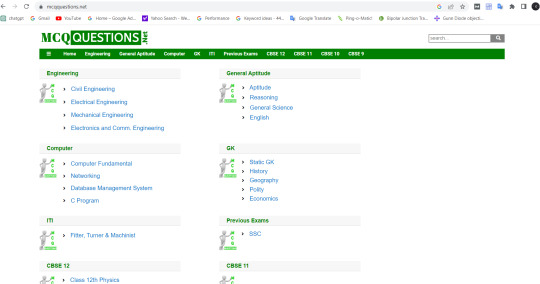Practice MCQ Questions NCERT, Engineering Technical, Quantitative Aptitude, General knowledge, Reasoning, and Current Affairs for Competitive Exam test.
Don't wanna be here? Send us removal request.
Text
How can I practice MCQs?
mcqquestions.net is the best website to practice MCQs
Practicing multiple-choice questions (MCQs) is a great way to improve your knowledge and test-taking skills. Here are some tips to help you effectively practice MCQs:
Understand the material: Ensure that you have a solid understanding of the subject matter before attempting MCQs. Review your textbooks, class notes, or other relevant resources to strengthen your knowledge base.
Identify reliable sources: Look for reputable sources of MCQs such as textbooks, study guides, online educational platforms, or previous exam papers. These sources often provide high-quality questions that align with your learning objectives.
Start with easy questions: Begin your practice with easier questions to build confidence and reinforce the basics. As you progress, gradually move on to more challenging questions to enhance your critical thinking and problem-solving skills.
Simulate exam conditions: Create an environment that mimics exam conditions as closely as possible. Sit in a quiet place, set a timer, and allocate a specific amount of time to complete the set of questions. This helps you practice managing time effectively and builds stamina for the actual exam.
Analyze incorrect answers: When you encounter questions you answer incorrectly, take the time to understand why you made the mistake. Analyze the concept behind the question, review related material, and ensure you grasp the underlying principles to avoid repeating the error in the future.
Review explanations: Many MCQ resources provide explanations for the answers. After attempting a set of questions, thoroughly review the explanations, even for the questions you answered correctly. This allows you to deepen your understanding of the concepts and learn from any misconceptions.
Mix topics and formats: To challenge yourself and improve your overall knowledge, mix different topics and question formats. This helps you develop the ability to apply your understanding across various contexts and prepares you for the diverse range of questions that may appear on an exam.
Track progress: Keep a record of your performance to monitor your progress over time. Note the areas where you struggle the most and focus additional practice on those topics. Tracking your progress provides motivation and helps you identify areas that require further attention.
Collaborate and discuss: Engage in study groups or online forums where you can discuss MCQs with peers. Sharing perspectives, explaining concepts to others, and seeking clarifications can enhance your understanding and expose you to different approaches.
Take breaks and practice regularly: Don't cram all your practice in a single session. Take regular breaks to avoid mental fatigue and maintain focus. Consistent practice over an extended period is more beneficial than sporadic intense sessions.
Remember that practicing MCQs is just one aspect of exam preparation. It is equally important to review concepts, solve problems beyond MCQs, and engage in active learning strategies to deepen your understanding.
0 notes
Text
Which is the best Mcq site?
mcqquestions.net is the best MCQ Site for SSC, IBPS, BANK PO and other various placement and interview Exam. mcqquestions.net provide Civil Engineering MCQ Questions, Electrical Engineering MCQ Questions, Mechanical Engineering MCQ Questions, Electronics Engineering MCQ Questions, Quantitative Aptitude Questions, Reasoning Questions, English MCQ Questions, GK MCQ Questions, General Science MCQ Questions, NIMI Mock Test, NCERT MCQ QUESTIONS Class 10 Science MCQ
0 notes
Text
Which website is similar to Examveda?
mcqquestions.net aptitude mcq questions and answers with detailed explanations for SSC, IBPS, Bank PO and Campus Selection competitive examinations, placement interviews, and various entrance tests. ...
studysite.org
edurev.in
competoid
compsciedu
brainly.in
toppr.com
gktoday.in
0 notes
Text
Reasoning MCQ
Reasoning MCQ
What is reasoning quiz?
A reasoning quiz typically refers to a set of questions or problems designed to test an individual's logical and analytical thinking skills. These quizzes often assess a person's ability to recognize patterns, make deductions, draw conclusions, and solve problems using logical reasoning.
Reasoning quizzes can cover various areas such as logical reasoning, abstract reasoning, numerical reasoning, spatial reasoning, and verbal reasoning. They are commonly used in educational settings, employment assessments, and competitive exams to evaluate a person's cognitive abilities and problem-solving aptitude.
In a reasoning quiz, you may encounter questions that involve series completion, analogies, syllogisms, puzzles, coding-decoding, visual reasoning, or logical deductions. The purpose is to assess your ability to think critically and apply logical principles to arrive at the correct answer.
Participating in reasoning quizzes can be a fun and challenging way to exercise your mind and improve your logical thinking skills. They can also help you identify areas where you might need improvement and provide valuable practice for exams or assessments that involve reasoning-based questions.
How can I solve reasoning questions?
Solving reasoning questions requires a systematic and logical approach. Here are some steps you can follow to tackle reasoning questions effectively:
Read the question carefully: Take the time to understand the given information and the requirements of the question. Pay attention to any patterns, relationships, or clues provided.
Identify the type of reasoning: Determine the specific type of reasoning being tested, such as logical, numerical, verbal, or spatial reasoning. This will help you apply the appropriate strategies and techniques.
Analyze the given information: Break down the information provided and look for any patterns, similarities, or sequences. Identify any rules or principles that govern the given data.
Make logical deductions: Use your analysis of the information to draw logical deductions or conclusions. Apply any relevant rules or principles to derive additional insights.
Use elimination techniques: If the question presents multiple options, eliminate the ones that are clearly incorrect or do not fit the given information. This narrows down your choices and increases your chances of finding the correct answer.
Look for patterns or relationships: Reasoning questions often involve patterns or relationships between elements. Look for consistent patterns, number sequences, analogies, or similarities among the given elements. These patterns can help you determine the logic behind the question.
Visualize or diagram the problem: For spatial reasoning questions or complex problems, it can be helpful to create diagrams, grids, or visual representations to better understand the relationships or arrangements of elements.
Practice and familiarize yourself with common question types: Reasoning questions often follow specific patterns or formats. By practicing different types of reasoning questions, you can become familiar with common strategies and techniques to apply in similar situations.
Manage your time: Reasoning questions can be time-consuming, so it's important to manage your time effectively. If you're stuck on a particular question, it may be best to move on and come back to it later. Prioritize questions based on your strengths and allocate time accordingly.
Review your answers: Once you have completed the quiz or exam, take the time to review your answers. Check for any errors or inconsistencies, and make sure your deductions and reasoning are sound.
Remember, solving reasoning questions effectively requires practice and exposure to different types of problems. The more you practice, the more you'll develop your reasoning skills and become better at tackling these types of questions.
Is pink coded as 1691411 then red?
Read more
0 notes
Text
mcqquestions.net
mcqquestions.net
https://twitter.com/McqquestionsNet
0 notes
Text
Electrical Engineering Questions and Answers pdf free download
Electrical Engineering Questions and Answers pdf free download

#gate electrical engineering books pdf download#ies books for electrical engineering pdf#abc of electrical engineering book pdf#electrical engineering books pdf free download in hindi#ies electrical objective book pdf#ssc latest news com pdf download#examtrix com electrical engineering#uppcl ae electrical book pdf download
0 notes
Text
Diploma Electrical objective questions answers
Diploma Electrical objective questions answers

#electrical mcq questions and answers pdf#electrical engineering 1000 questions answers pdf download#made easy 3500 mcq electrical pdf free download#electrical mcq pdf free download#mcq on basic electrical engineering pdf#electrical objective questions in hindi#practical electrical questions and answers pdf#electrical mcq book pdf
0 notes
Text
Electrical Objective Questions
Electrical Objective Questions

#electrical mcq book pdf#mcq on basic electrical engineering pdf#electrical mcq online test#basic electrical mcq#basic electrical engineering mcq book#electrical4u mcq on basic electrical#basic electrical mcq online test#diploma electrical objective questions answers
0 notes
Text
Electrical Engineering mcq for Competitive Exam
Electrical Engineering mcq for Competitive Exam

#electrical engineering mcq questions and answers pdf#made easy 3500 mcq electrical pdf free download#electrical mcq questions and answers pdf#electrical mcq pdf free download#electrical mcq online test#electrical mcq book pdf#electrical engineering 1000 questions answers pdf download#self study 365 electrical engineering mcq
0 notes
Text
Electrical Engineering MCQs
Electrical Engineering MCQs

#electrical#mcqquestions.net#basic electrical engineering mcq book#electrical4u mcq#examveda electrical mcq#mcq on basic electrical engineering pdf#electrical mcq online test#electrical machine mcq#basic electrical mcq online test#basic electrical mcq questions and answers
0 notes
Text
Electrical Engineering Questions and Answers for Competitive Exams

I can provide some information on electrical engineering topics that are commonly asked in competitive exams.
What is Ohm's law? Ohm's law states that the current through a conductor between two points is directly proportional to the voltage across the two points, and inversely proportional to the resistance between them.
What is Kirchhoff's laws? Kirchhoff's laws are two fundamental laws of circuit analysis that describe the conservation of charge and energy in an electrical circuit. The first law, Kirchhoff's current law (KCL), states that the total current entering a junction must equal the total current leaving the junction. The second law, Kirchhoff's voltage law (KVL), states that the sum of the voltages around a closed loop in a circuit must equal zero.
What is the purpose of a diode? A diode is a two-terminal electronic component that allows current to flow in only one direction, acting as a one-way valve for electric current. Diodes are commonly used in rectifier circuits to convert AC to DC, as voltage stabilizers, and to protect circuits from high-voltage transients.
What is the difference between AC and DC? AC (Alternating Current) changes direction periodically, while DC (Direct Current) flows in only one direction. AC is used in the electrical grid because it is more efficient to transmit over long distances, while DC is used in batteries and electronic devices.
What is a transistor and what is its function? A transistor is a three-terminal semiconductor device that can be used as an amplifier or switch. The transistor controls the flow of current between the input and output terminals by adjusting the voltage applied to the third terminal, the base. Transistors are widely used in electronic circuits for amplification, switching, and voltage regulation.
What is an inductor and how does it work? An inductor is a passive electrical component that stores energy in a magnetic field when electric current flows through it. Inductors oppose changes in current and can be used to filter, store, or regulate energy in an electrical circuit.
What is a capacitor and how does it work? A capacitor is a passive electrical component that stores energy in an electric field when a voltage difference exists between its plates. Capacitors can be used to store energy, filter signals, and regulate voltages in an electrical circuit.
What is a microcontroller?
0 notes
Text
Which website is better for solving MCQ electrical for a competitive examination?
MCQQuestions.net is a website that offers a wide variety of multiple choice questions (MCQs) for electrical engineering students preparing for competitive examinations. The website is designed to provide students with a comprehensive and convenient way to study and practice for exams.
One of the main features of the website is its large collection of MCQs on various electrical engineering topics. These questions are designed to cover a wide range of concepts, including circuit analysis, power systems, control systems, and more. The questions are also divided into different levels of difficulty, making it easy for students to find questions that match their skill level.
Another great feature of the website is its user-friendly interface. The website is easy to navigate and allows students to search for questions by topic, level of difficulty, and other criteria. The website also includes a timer function, which allows students to practice answering questions under timed conditions, simulating the real exam experience.
In addition to the MCQs, the website also includes detailed explanations for each question, providing students with a deeper understanding of the concepts behind the questions. This is especially helpful for students who struggle with certain topics or need additional help.
Overall, MCQQuestions.net is an excellent resource for electrical engineering students preparing for competitive examinations. The website's large collection of high-quality questions, user-friendly interface, and detailed explanations make it a valuable study tool for students of all skill levels.
The website is especially useful for students preparing for competitive exams such as GATE, ESE, and other engineering entrance exams. The questions are curated by experts and are updated regularly to keep up with the latest trends and syllabus of the exams.
In conclusion, if you're an electrical engineering student preparing for a competitive examination, I highly recommend visiting MCQQuestions.net. The website's wide range of high-quality questions, user-friendly interface, and detailed explanations make it an invaluable study tool that can help you succeed in your exams.
0 notes
Text
Electrical Engineering Interview Questions and Answers pdf
Can you explain the difference between AC and DC electricity? Answer: AC (Alternating Current) electricity alternates the direction of the current flow while DC (Direct Current) electricity flows in only one direction. AC is typically used for power transmission and distribution while DC is used in electronic devices such as batteries and semiconductors.
Can you explain Ohm's Law? Answer: Ohm's Law states that the current flowing through a conductor is directly proportional to the voltage applied across it and inversely proportional to the resistance of the conductor. In mathematical terms, it is represented as I = V/R (where I is current, V is voltage and R is resistance).
What is the function of a transformer in electrical systems? Answer: A transformer is used to transfer electrical energy from one circuit to another, either by increasing or decreasing the voltage. This allows for the safe and efficient transfer of power over long distances.
Can you explain the difference between a generator and a motor? Answer: A generator is a device that converts mechanical energy into electrical energy while a motor is a device that converts electrical energy into mechanical energy. A generator is used to produce electricity while a motor is used to drive machinery.
How do you calculate power in an electrical circuit? Answer: Power in an electrical circuit can be calculated using the formula P = VI (where P is power, V is voltage and I is current). This formula states that power is equal to the product of voltage and current in a circuit.
Can you explain the purpose of a diode? Answer: A diode is a semiconductor device that allows current to flow in only one direction. It is used to rectify AC voltage into DC voltage.
What is the function of a capacitor in an electrical circuit? Answer: A capacitor is an electronic component that stores electrical energy in an electric field. It is used in circuits to smooth out voltage fluctuations, filter noise, and to store energy for later use.
Can you explain the difference between a series and parallel circuit? Answer: In a series circuit, the current flows through all components in a single path. While in a parallel circuit, the current divides and flows through multiple paths. In a series circuit, the total resistance is equal to the sum of all individual resistances, while in a parallel circuit the total resistance is less than the smallest individual resistance.
What is the purpose of an electric power grid? Answer: An electric power grid is a network of power generation, transmission, and distribution facilities that deliver electricity to customers. It is used to transmit power over long distances and to connect different power sources to meet the varying demand for electricity.
Can you explain the difference between a motor starter and a motor controller? Answer: A motor starter is a device used to start and stop an electric motor while a motor controller is used to control the speed, torque, and direction of an electric motor. A starter limits the current flowing through the motor while a controller regulates the voltage and frequency supplied to the motor.
READ MORE QUESTIONS
0 notes
Text
What are the 10 most common interview questions and answers?
Can you tell me about yourself? This is often the first question asked in an interview. It's an open-ended question that allows you to highlight your relevant skills, experiences, and qualifications.
Answer: I am a highly motivated individual with [x] years of experience in [industry/field]. I have a proven track record of [achievement/skill], and I am excited to bring my skills and experiences to your company.
Why do you want to work here? This question is designed to gauge your interest in the company and the position.
Answer: I am impressed by the company's mission and values, as well as its reputation in the industry. I believe that this position is a great fit for my skills and interests, and I am excited about the opportunity to contribute to the team's success.
What are your strengths? This question allows you to highlight your positive attributes and how they align with the position.
Answer: I am a strong leader with excellent communication and problem-solving skills. I am also highly organized and able to manage multiple projects at once.
What are your weaknesses? This question is designed to reveal areas where you may need improvement, but it's also an opportunity to show how you're working on them.
Answer: I tend to be a perfectionist, which can sometimes lead to me spending too much time on a task. However, I am working on setting more realistic deadlines for myself and delegating more responsibilities to my team.
Why did you leave your last job? This question is designed to uncover any issues or concerns you may have had with your previous employer.
Answer: I left my last job because I was seeking a new challenge and the opportunity to grow in my career. The company was not able to provide the opportunities for growth and development that I was seeking.
How do you handle stress? This question is designed to gauge your ability to handle pressure and stressful situations.
Answer: I handle stress by staying organized, prioritizing tasks, and taking breaks when necessary. I also make sure to maintain a healthy work-life balance and practice stress-relieving activities such as exercise and meditation.
Can you give an example of a time when you had to solve a difficult problem? This question is designed to assess your problem-solving skills and ability to think on your feet.
Answer: One example was when [describe a specific situation and how you resolved it]. This experience taught me the importance of [skill or lesson learned].
How do you handle conflicts with coworkers? This question is designed to gauge your ability to handle difficult situations and work well with others.
Answer: I handle conflicts by staying calm and professional, and by trying to understand the other person's perspective. I also make sure to communicate clearly and effectively, and to work towards finding a solution that is beneficial for everyone.
Can you tell me about a time when you had to lead a team? This question is designed to assess your leadership skills and ability to manage a team.
Answer: One example was when I led a team of [number] people on a [project/initiative]. I was responsible for setting goals, delegating tasks, and providing guidance and support. Through my leadership, the team was able to achieve [result].
What are your long-term career goals? This question is designed to gauge your ambition and plans for the future.
Answer: My long-term career goal is to [specific goal]. I am planning to achieve this by [steps you
READ MORE QUESTIONS
0 notes
Text
Top Electrical Engineering Technical Questions and Answers Pdf
Electrical engineering is a field that deals with the study and application of electricity, electronics, and electromagnetism. It encompasses a wide range of subfields, including power engineering, control systems engineering, telecommunications, and computer engineering. Electrical engineers play a critical role in designing, developing, and maintaining a wide range of electrical systems and devices, including power generators, motors, control systems, and communication systems.
As the field of electrical engineering is vast, it can be challenging to prepare for competitive exams in this field. However, with the right approach, it is possible to successfully pass these exams and achieve your goals. One of the most effective ways to prepare for electrical engineering competitive exams is to practice with a wide range of questions and answers.
There are many resources available online mcqquestions.net offer practice questions and answers in pdf format. These resources provide a comprehensive overview of the key concepts that are likely to be covered on the exam, along with practice questions and detailed answers. The questions and answers are usually presented in the form of multiple-choice questions (MCQs) which are a common type of question format in most of the competitive exams.
These pdfs are a great way to prepare for the exam as they provide a clear and concise overview of the key concepts, along with practice questions that help to reinforce the concepts. Additionally, the answers provided in the pdfs are detailed and help to explain the reasoning behind the correct answer, which is particularly useful for understanding why a certain answer is correct.
It is important to note that while practice questions and answers in pdf format are a great resource, they should be used in conjunction with other study materials. This includes textbooks, online tutorials, and lectures. It is also important to stay up-to-date with the latest developments in the field of electrical engineering by reading industry journals, attending conferences, and participating in professional development opportunities.
Another important aspect of preparing for electrical engineering competitive exams is understanding the exam format. This includes the types of questions that will be asked, the duration of the exam, and the overall structure of the test. It is also important to develop good time management skills, as this will help you to manage your time effectively during the exam.

A good understanding of the basic concepts and principles of electrical engineering is also crucial. This includes understanding the fundamental laws of electricity, such as Ohm's law and Kirchhoff's laws, as well as the properties of different types of electrical circuits and components. Additionally, it is important to have a good grasp of mathematical concepts and techniques, such as calculus and differential equations, as they are often used in electrical engineering calculations. Furthermore, it is also important to have a good understanding of the different software and tools used in the field of electrical engineering, such as simulation software, CAD software, and programming languages.
In conclusion, preparing for electrical engineering competitive exams requires a combination of practice, study, and staying current with the latest developments in the field. By utilizing resources such as practice questions and answers in pdf format, along with staying organized and seeking help when needed, you can increase your chances of success on the exam. Additionally, having a good understanding of the basic concepts and principles, mathematical concepts and techniques, and software and tools used in the field of electrical engineering, developing good time management skills and understanding the exam format is crucial.
0 notes
Text
electrical engineering questions and answers for competitive exams pdf
Electrical engineering is a vast field that encompasses a wide range of subfields, including power engineering, control systems engineering, telecommunications, and computer engineering. As such, it can be challenging to prepare for competitive exams in this field. However, with the right approach, it is possible to successfully pass these exams and achieve your goals.
One of the most effective ways to prepare for electrical engineering competitive exams is to practice with a wide range of questions and answers. There are many resources available online that offer practice questions and answers, including the website mcqquestions.net, which has a wide range of multiple-choice questions in the field of electrical engineering. These questions cover a wide range of topics, including power systems, control systems, electronics, and telecommunications.
Practicing with these questions can help you to improve your understanding of key concepts and develop your problem-solving skills. Additionally, by taking practice tests, you can familiarize yourself with the exam format and develop your time management skills.
Another great resource for preparing for electrical engineering competitive exams is the use of study guides and practice tests in pdf format. These guides provide a comprehensive overview of the key concepts that are likely to be covered on the exam, along with practice questions and detailed answers.
In addition to practice questions and study guides, it's also important to stay up-to-date with the latest developments in the field of electrical engineering. This could involve reading industry journals, attending conferences, and participating in professional development opportunities.
It is also important to have a good understanding of the basic concepts and principles of electrical engineering. This includes understanding the fundamental laws of electricity, such as Ohm's law and Kirchhoff's laws, as well as the properties of different types of electrical circuits and components.

Additionally, it is important to have a good grasp of mathematical concepts and techniques, such as calculus and differential equations, as they are often used in electrical engineering calculations.
Furthermore, it is also important to have a good understanding of the different software and tools used in the field of electrical engineering, such as simulation software, CAD software, and programming languages.
Overall, preparing for electrical engineering competitive exams requires a combination of practice, study, and staying current with the latest developments in the field. By utilizing resources such as mcqquestions.net and study guides in pdf format, along with staying organized and seeking help when needed, you can increase your chances of success on the exam. Additionally, having a good understanding of the basic concepts and principles, mathematical concepts and techniques, and software and tools used in the field of electrical engineering is crucial.
0 notes